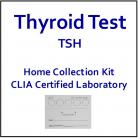Thyroid Test
|
$56.95
|
Women's Health Monitoring Test $119.95 |
|
$56.95
|
Women's Health Monitoring Test $119.95 |
|
$56.95
|
|
Women's Health Monitoring Test $119.95 |
Thyroid TSH Tests
What is TSH?
TSH (thyroid stimulating hormone) is a chemical substance produced by the pituitary gland in the back of your brain that stimulates the thyroid gland so it can release its own hormones into the bloodstream. Your thyroid gland is a butterfly shaped gland located at the front part of your throat, just below your Adam's apple, that produces its’ own separate hormones. TSH levels affect thyroid activity, and your thyroid regulates almost every cell in your body as well as various organs and tissues. Your thyroid is responsible for controlling energy usage, body temperature, weight, heart rate, and your overall metabolism. If your thyroid gland is not working properly, a variety of severe medical problems can possibly result.
TSH Levels and What They Mean
Measuring TSH levels should not be the only tool used to diagnose thyroid disease. If your results are below or above normal you should see your doctor immediately for a clinical evaluation and measurement of T3 & T4 hormone levels. Other blood tests, imaging tests, or biopsies may need to be performed to confirm the initial findings. If diagnosed and treated properly, a thyroid disorder can be controlled and you can lead a very normal and active life.
Lower TSH = Overactive Thyroid / Hyperthyroidism
If the thyroid is overactive and producing too much thyroid hormone, the pituitary senses this and then usually slows or shuts down TSH production, so that the thyroid will slow down its production of its’ hormone. This drop in TSH is an attempt to return thyroid hormone levels to normal. Some common symptoms of overactive thyroids are weight loss, fatigue, intolerance to heat nervousness, insomnia, tremors, muscle weakness, heart palpitations, frequent bowel movements, and especially light menstrual periods in women.
Higher TSH = Underactive Thyroid / Hypothyroidism
If the thyroid for some reason does not produce enough thyroid hormone, the pituitary detects this and it immediately switches into gear. The pituitary then makes MORE TSH, to help trigger the thyroid to increase production of its’ hormone therefore regulating the function. This is the most common form of thyroid disease. Some common symptoms of weight gain, depression, fatigue, intolerance to cold, dry skin, hair dryness or loss, forgetfulness, muscle cramps, edema, constipation, and especially heavy menstrual periods in women.
Some statistics regarding thyroid disease in the U.S. according to The National Women's Health Information Center: • Approximately 1 in 13, 7.35%, or 20 million people in the U.S. currently have a thyroid disorder • Undiagnosed prevalence of Thyroid disorders: About 13 million (based on estimates from the AACE, as reported by Reader's Digest 1; estimated 8 million people (American Medical Women's Association) • Lifetime risk for Thyroid disorders: 1 in 8 women during their lifetime in the US (American Medical Women’s Association); 1 in 8 for women (NWHIC)






